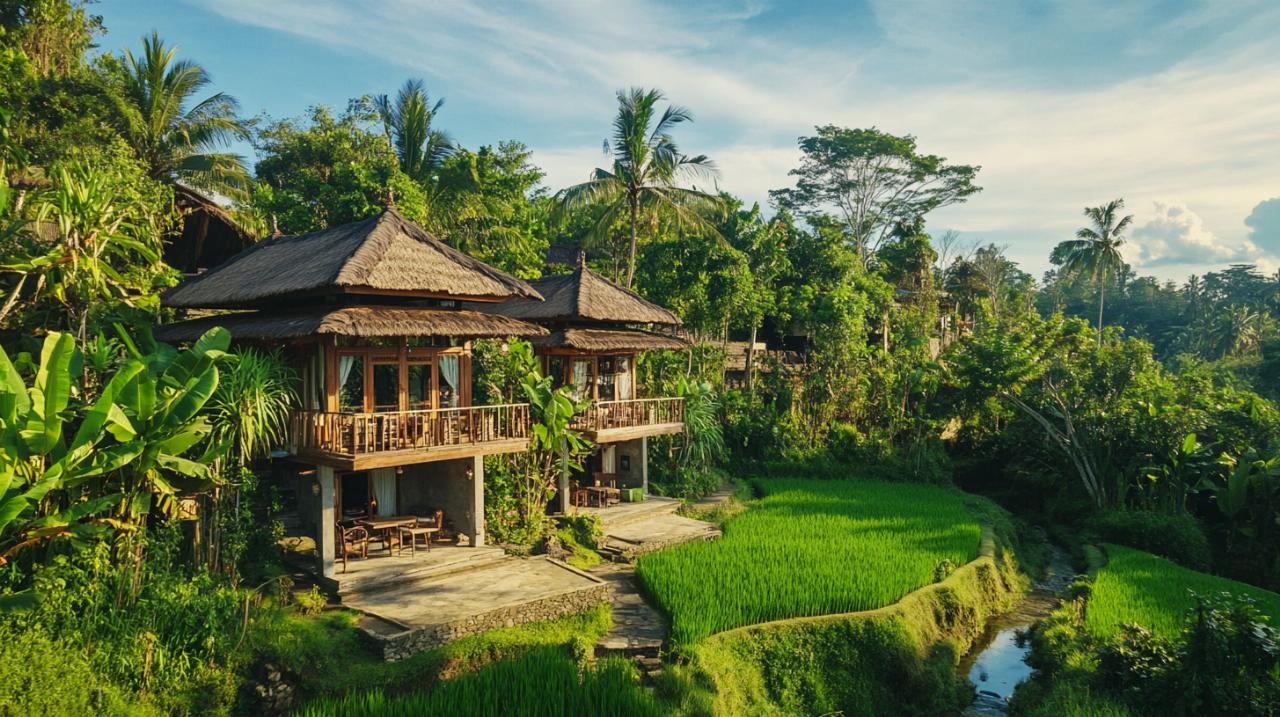Bali, with its lush landscapes, vibrant culture, and spiritual essence, has long been a paradise for travellers seeking connection with nature. As sustainable tourism gains momentum globally, eco-lodges in Bali have emerged as the perfect blend of responsible travel and authentic experience. These environmentally conscious accommodations offer travellers the opportunity to enjoy Bali's breathtaking beauty while minimising their ecological footprint and supporting local communities.
Sustainable practices at balinese eco-lodges
The heart of Bali's eco-lodge movement lies in its commitment to environmental stewardship. According to recent travel guides from www.hotelessidi.es, these accommodations implement various strategies to reduce their impact on Bali's fragile ecosystems while providing comfortable stays for guests. The 2025 travel guide highlights how these establishments have become pioneers in sustainable tourism across Indonesia.
Renewable energy and resource conservation
Eco-lodges throughout Bali have embraced innovative approaches to energy consumption. Many properties now operate partially or entirely on renewable energy sources such as solar power, reducing dependency on fossil fuels. Water conservation efforts are particularly crucial, as traditional Balinese irrigation systems face increasing pressure from conventional tourism development. Some leading eco-resorts have implemented rainwater harvesting systems, greywater recycling, and efficient fixtures that significantly reduce water usage without compromising guest comfort.
Waste management and plastic-free initiatives
The commitment to sustainability extends to comprehensive waste management protocols. Establishments like Nadi Nature Resort have developed impressive organic waste recycling systems, transforming kitchen scraps into nutrient-rich compost for their gardens. This circular approach minimises landfill contributions while enhancing on-site food production. The zero-waste philosophy has prompted many eco-lodges to eliminate single-use plastics entirely, replacing them with bamboo straws, refillable toiletry containers, and other biodegradable alternatives. Some properties have even partnered with organisations like Sungai Watch and Urban Compost Bali to extend their positive impact beyond their boundaries.
Supporting local communities through eco-tourism
The benefits of eco-lodges in Bali extend well beyond environmental considerations. These establishments serve as vital economic engines for surrounding communities, creating sustainable livelihoods and preserving cultural heritage.
Fair employment and economic opportunities
Eco-lodges prioritise hiring from local villages, providing fair wages and opportunities for career advancement. For instance, Nadi Nature Resort actively recruits staff from the Angseri community, ensuring tourism revenue directly benefits residents. Additionally, many properties source produce, crafts, and services from nearby villages when they cannot produce items themselves. This farm-to-table approach not only reduces carbon footprints associated with transportation but also strengthens regional economic resilience. By 2025, this model of community-integrated tourism has become increasingly important to France and other nations where tourism represents a significant economic sector.
Preservation of Balinese Culture and Traditions
Cultural sustainability forms another pillar of the eco-lodge philosophy in Bali. Many establishments offer authentic Balinese cultural workshops, traditional ceremonies, and artistic performances that help preserve indigenous knowledge and customs. Guests can participate in activities ranging from traditional cooking classes to temple visits and rice farming experiences. The Bali Institute has developed specialised programmes that combine cultural immersion with adventure, catering to university students, corporate groups, and individual travellers interested in deeper connections with Balinese heritage.
Immersive natural experiences in eco-friendly surroundings
The allure of eco-lodges lies in their ability to connect guests with Bali's extraordinary natural environment without compromising ecological integrity. From mountain retreats to coastal havens, these accommodations offer unparalleled access to diverse ecosystems.
Connecting with bali's diverse ecosystems
Eco-lodges are strategically located across Bali's varied landscapes, each offering distinct natural experiences. In Ubud, the cultural centre of Bali, bamboo and teak resorts nestle among ancient forests and terraced rice paddies. The quieter Sidemen region provides spectacular agricultural vistas, while Tabanan offers jungle immersion experiences. For those seeking elevation, Kintamani provides mountain retreats with volcanic views, and coastal eco-lodges in Amed blend seaside relaxation with marine conservation initiatives. Some properties, like Firefly Eco Lodge, offer unique treetop accommodations that quite literally elevate the guest experience, allowing visitors to sleep among the canopy.
Mindful activities and wellness opportunities
The wellness dimension of eco-lodges extends beyond environmental consciousness to personal wellbeing. Many establishments feature dedicated spaces for yoga, meditation, and holistic health practices that harmonise with their natural surroundings. Spa treatments incorporating indigenous herbs and traditional Balinese healing techniques provide restorative experiences for guests. Some properties offer comprehensive wellness programmes including detox regimens, silent retreats, and mindfulness training. These activities not only enhance the guest experience but also align with the regenerative tourism model that seeks to leave both visitors and destinations better than before.
Architectural innovation in balinese eco-lodges
The physical design of eco-lodges represents a fascinating fusion of traditional wisdom and contemporary sustainable innovation. These structures demonstrate how thoughtful architecture can minimise environmental impact while maximising comfort and aesthetic appeal.
Traditional building techniques meet modern sustainability
Eco-lodges often showcase vernacular Balinese building methods adapted for modern sustainability requirements. Local materials like bamboo, reclaimed teak, and natural fibres feature prominently in construction, reducing embodied carbon while honouring indigenous architectural traditions. Nadi Nature Resort exemplifies this approach, having reduced poured concrete usage by 80% through an innovative point foundation system. This technique minimises ground disturbance while providing structural stability. Passive cooling strategies, including strategic orientation, natural ventilation, and appropriate insulation, reduce or eliminate the need for energy-intensive air conditioning in many properties.
Biophilic design elements for guest comfort
The concept of biophilic design, which integrates natural elements into built environments, permeates eco-lodge architecture in Bali. Open-air bathrooms with tropical plantings, living walls, and seamless indoor-outdoor transitions create spaces that feel harmoniously integrated with the surrounding landscape. Luxury tented resorts offer canvas accommodations that provide comfort with minimal environmental disturbance. Natural materials, earth tones, and organic textures dominate interior spaces, creating calming environments that enhance guest wellbeing while reinforcing connections with nature.
Planning your eco-lodge stay in bali
For travellers interested in experiencing sustainable accommodation in Bali, careful planning can enhance both the personal enjoyment and positive impact of their visit.
Top eco-lodges across different regions
The diversity of eco-lodges across Bali ensures options for various preferences and budgets. Luxury seekers might gravitate toward high-end properties with private infinity pools overlooking rice terraces, while budget-conscious travellers can find dormitory accommodations starting around $10USD per night. Family-friendly eco-resorts offer educational activities and spacious accommodations, while couples might prefer intimate retreats with romantic settings. The 2025 travel guides categorise establishments by speciality, highlighting properties particularly suited for weekend getaways, long-term stays, or those with exceptional views or locations.
What to Pack for a Responsible Holiday
Preparing appropriately for an eco-lodge stay enhances both comfort and sustainability. Reusable water bottles, natural sunscreen, biodegradable toiletries, and quick-dry towels reduce environmental impact while travelling. Light, breathable clothing suits Bali's tropical climate, though a light jacket might be welcome in mountain locations like Kintamani. Insect repellent, preferably natural, proves essential for enjoying outdoor spaces comfortably. Some eco-lodges provide filtered water stations, reducing the need for bottled water, while others offer bamboo toothbrushes and natural soaps, allowing guests to travel lighter while maintaining sustainable practices throughout their journey.
